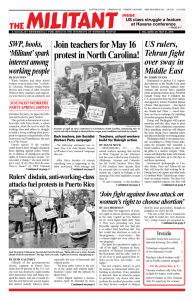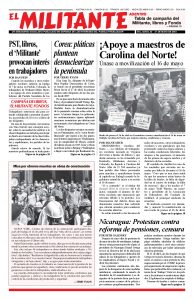Fighting Racism in World War II is one of Pathfinder’s Books of the Month for May. This selection — “CIO Committee Fights Jim Crow” from the Nov. 4, 1944, Militant — is by Charles Jackson, the pen name for Dr. Edgar Keemer. Keemer, a Black doctor, was indicted as a draft dodger during World War II because he opposed discrimination in the Navy. With the support of the Socialist Workers Party and others, he fought the charges and the government dropped the case. Keemer was in the SWP from 1943 to 1947, subsequently returning to practice medicine in Detroit. In his 1980 autobiography, Confessions of a Pro-Life Abortionist, he writes about his support for women’s rights and how he was imprisoned for 14 months for performing abortions, and his role in the fight to legalize the procedure. Copyright © 1980 by Pathfinder Press. Reprinted by permission.
Just because the Negro worker today is a hundred times as trade union conscious as he was fifteen years ago, and just because there is a concerted effort on the part of the progressive labor movement to fight for industrial equality regardless of race, is not enough to warrant a shout of victory. These tendencies have forced the ruling class to imprint more firmly the pattern of segregation and thereby more forcibly crystallize the well-indoctrinated interracial prejudices. The attacks upon the color line have not caused the owning class to discard it as an antilabor weapon but, rather, to draw it all the more tightly.

The CIO, which contains more progressive elements than any other union organization
in the country, has recently embarked on a counterattack which, if carried on with increasing militancy, will bode no good for the vile plans of those who want to continue their exploitation by pitting the Negro and the white workers against each other. A significant unit in this counterattack is the CIO Committee to Abolish Racial Discrimination. This committee has been setting up new branches all over the country and on more than one occasion has been the instrumental factor that meant success instead of defeat in various fights against racial discrimination.
According to Director George Weaver’s most recent report, the number of state, county, and municipal committees has increased from fifty as of March 15, 1944, to eighty-five as of August 15, 1944. Most significant is the fact that committees have been organized for the first time in Georgia, North Carolina, West Virginia, Kentucky, Texas, Kansas, and Alabama. Any movement capable of organizing effective branches committed to abolish racial discrimination in those states really means business. Furthermore, it bids fair to become the medium through which will come the final victorious assault on all the forces of reaction that are so firmly entrenched in the “deah old South.”
In a series of conferences held by the Ohio state committee, the importance of upgrading and seniority rights without regard to race was stressed. One of the discussions centered upon the responsibility of the union in the postwar period in relation to the minority question. The importance of maintaining full employment was considered the key to the racial question. It was admitted that without full employment, the scramble of returning soldiers and war workers to compete for too few jobs will pit majority groups against minority groups and vice versa. On this point, of course, we know and we warn again that it will be impossible to maintain full employment until we have socialism.
The Michigan state committee initiated the prosecution of the Cody Hotel in Grand Rapids, involving discrimination on July 11 during the Michigan CIO convention. The delegation from Local 208, UAW-CIO, had arranged to house their delegates at this hotel. The local had received written confirmation from the manager agreeing to house the entire delegation. The white delegates arrived first and were housed. Later, when the Negro members of the delegation arrived, they were refused accommodations. The following resolution was submitted to the convention and unanimously endorsed: “That the hotel be criminally prosecuted and that until these issues are resolved in favor of CIO policy, the Hotel Cody be placed on the unfair list.” Similar action was initiated last week by the UAW-CIO against the Webster Hall Hotel in Detroit.
The Philadelphia committee, the Industrial Union Council, which was only appointed in April, reports successful cases involving discrimination in upgrading Negro workers in the steel industry in the Philadelphia area. One was a job as narrow-gauge engineer, a job never yet held by a Negro. In the industrial cases, the Committee to Abolish Racial Discrimination has been working in close collaboration with the FEPC [Fair Employment Practice Committee]. …
In areas where there was already friction, this committee has made efforts to educate the backward, prejudiced workers so that working-class solidarity could be maintained.
An outstanding example was in Marion, Ohio, where a group of Mexican workers had been imported. Feeling the job insecurity that is normal under capitalism, with its ever-increasing catastrophic depressions, many of the workers showed resentment against the Mexican workers. Largely through the efforts of the county antidiscrimination committee the white workers were educated, the Mexican workers were unionized, and a dangerous struggle between workers was averted.
These are only a few examples of what the CIO is doing. It deserves and has the allegiance of the Negro people. With the more crushing oppressions that are planned by the ruling class, the labor movement will have to adopt more militant means to defend the brown workers against race discrimination. In defense of the trade union movement itself, it is of utmost importance that every militant worker, black or white, rally support within his union to fight discrimination and Jim Crowism wherever it rears its ugly head.

